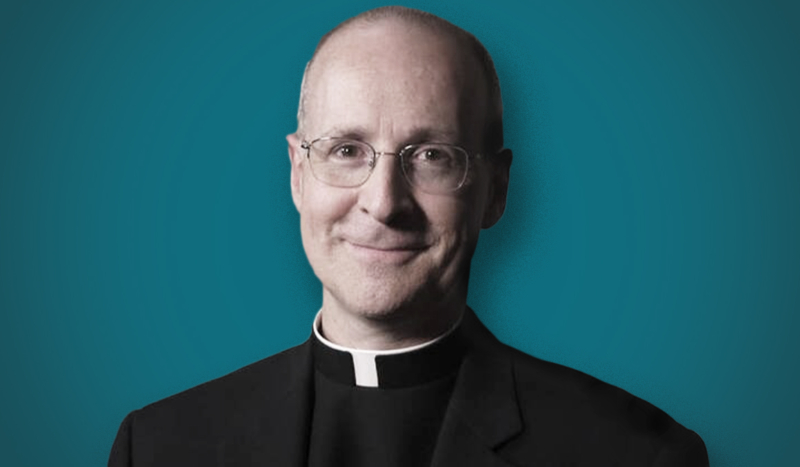
CV NEWS FEED // America Media last year launched “Outreach” to promote the tenets of the LGBTQ movement in Catholic institutions such as churches and schools. In celebrating the effort’s first anniversary, celebrity Jesuit priest Fr. James Martin claimed that there is “a great deal of homophobia in the church.”
“Before the church teaches it needs to listen—to psychiatrists, psychologists, physicians, social scientists, biologists and, especially, transgender people themselves,” wrote Martin in a post titled “Six things we’ve learned during Outreach’s first year.” Martin is a founder of Outreach.
Martin told the story of Outreach’s founding and first year. The website initially “included a space for news and essays; a resource page for articles, videos, books from around the world and in multiple languages; and a section called ‘Gaudete,’ where we could lift up parishes and schools that welcomed LGBTQ Catholics,” he wrote:
We launched on May 1, 2022, with over 300 resources contributed by dozens of advisors from the U.S. and abroad. Since then, we’ve published 150 original articles by over a hundred contributors, ranging from well-known scholars and theologians and internationally recognized experts to LGBTQ high school students relating their experiences of the church and of God. We often hear from our readers that they would not have known some of these perspectives unless they’d found them on Outreach.
Martin went on to tout the “solid theology” provided by pro-LGBTQ scholars via Outreach. He cited an inaugural essay by a scholar who cited Scripture to make a case for the LGBTQ movement. In the community of the Church, “there are no second-class citizens,” the essay read in part:
We had to learn that concerning people of color and concerning women. And now, the time has come to face the same gospel reality about LGBTQ persons as others are welcomed as first-class citizens in the community of faithfulness and justice.
…our hope is in the God of the gospel and in no other, the full acceptance and embrace of LGBTQ persons follows as a clear mandate of the Gospel in our time. Claims to the contrary are contradictions of the truth of the Gospel on all the counts indicated above.
Martin also wrote Outreach offers needed support to “transgender Catholics.” “In just the last year, the targeting of transgender people, mainly in the political sphere, but also in the religious world, has increased dramatically,” Martin wrote. Here, he linked to a VOX article about legislative efforts by state lawmakers to bar males from women’s sports and to protect children from being subjected to sexual surgeries, puberty-blockers, and cross-sex hormones.
To counteract such efforts, Martin wrote that Outreach has highlighted “the stories of transgender Catholics, like that of Christine Zuba, a Eucharistic minister at her parish.” Outreach has also promoted the work of other Catholic groups promoting the “transgender” movement, Martin wrote, and:
Finally, we’ve looked at some directives from various dioceses on gender issues, and, thanks to two moral theologians James Bretzke, SJ, and Charles Bouchard, OP, we’ve studied the recent U.S.C.C.B. document on transgender healthcare directives.
Catholic bishops in the U.S. have been increasingly outspoken against the LGBTQ movement, and in particular its new aims of targeting children and women’s sports. Martin and his organization Outreach have opposed the Church’s efforts in this area, publishing regular criticisms against the United States Conference of Catholic Bishops and other Catholic leaders who defend Catholic teachings on sexuality and marriage.
“The amount of vitriol directed at transgender people and the cruel things some Catholics say about them astonishes me,” Martin wrote:
Of course, there are still many questions about the origins and medical treatment of this phenomenon, especially among youth. But before the church teaches it needs to listen—to psychiatrists, psychologists, physicians, social scientists, biologists and, especially, transgender people themselves. Overall, this is a group that Outreach wants to accompany, listen to and advocate for, especially since so few others in the church seem to be doing so.
Martin later lamented new “directives from some U.S. dioceses severely restricting the participation of transgender people in the church.” He was apparently referencing efforts by some bishops to defend their flocks, and in particular school children, from the LGBTQ movement’s opposition to Catholic teaching. “These new documents have made many transgender people feel like they have not been listened to by their own church,” Martin wrote.
Martin also cited “hate” Outreach receives in the form of comments on social media, which he compared to attacks on Jesus Christ. “If anything, such attacks inspire us in our efforts to minister to a community that faces that kind of hatred,” Martin wrote. “During his public ministry, Jesus consistently stood with those on the margins in any way. Jesus stood with, as we Jesuits say, ‘the excluded.’ That’s where we want to stand, too.”
Martin stated that things are “getting better” for “LGBTQ Catholics,” however. He cited what he called Pope Francis’ “historic stance against the criminalization of homosexuality” as an example. Francis’ stated position against harsh legal punishments for sexual sins was in fact consistent with similar pronouncements by the late Pope Benedict XVI.
“Second, a number of cardinals, archbishops and bishops have called for the church to reconsider terming homosexual acts as ‘intrinsically disorder’ in the Catechism, which LGBTQ people often say is one of the biggest stumbling blocks to feeling welcome in their church,” Martin continued:
These include Cardinal Robert W. McElroy of San Diego, Cardinal Blase Cupich of Chicago, Cardinal Jean-Claude Hollerich, S.J., of Luxembourg and Bishop John Stowe of Lexington, Ky.
“Finally,” Martin concluded,
to the surprise of many, the latest working document from the Synod mentioned the need to welcome LGBTQ people in the church. When I was in Rome last November, someone who helped with the Synod report told me that half of all diocesan documents from around the world referenced LGBTQ issues. These are all decided steps forward.

